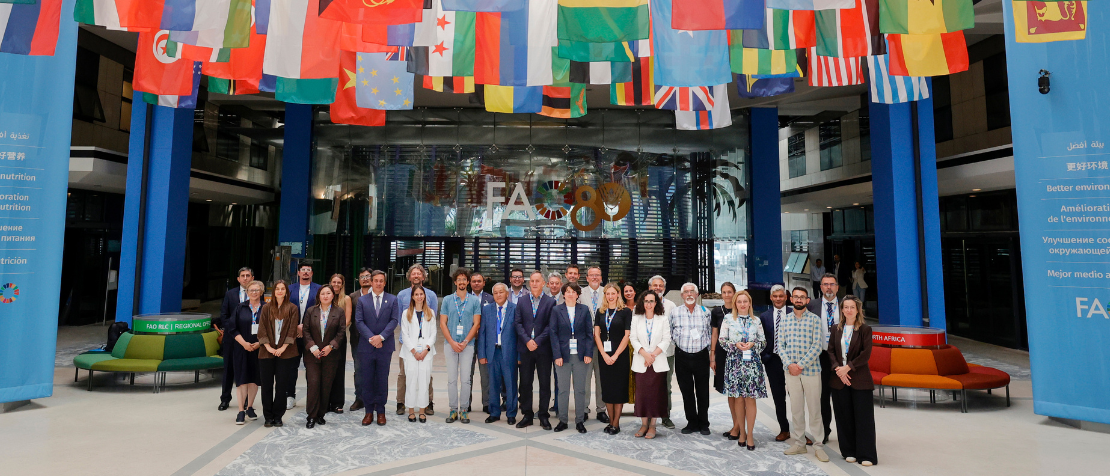FAO fosters interregional exchange to support family farming
.png?sfvrsn=eca7e2fa_3)
©FAO/Anastasiia Borodaienko
Family farming plays a central role in global food systems, providing most of the world’s food supply and supporting the livelihoods of more than 2.5 billion people.
Supporting family farmers was the topic of an Interregional Dialogue held this week with representatives from Europe and Central Asia and from Latin America and the Caribbean.
Representatives of governments, farmers’ organizations, civil society and academia from the two regions gathered on 22 and 23 September in Rome for the Interregional Dialogue on Family Farming for Europe and Central Asia to exchange good practices and discuss priority directions for supporting family farmers.
Despite their crucial role in food production, family farmers face persistent challenges, including limited access to land, markets, information and technology, not to mention the increasing impacts of climate change. The Interregional Dialogues – part of Regional Technical Platform for Family Farming, which is led by the Food and Agriculture Organization of the United Nations (FAO) in Latin America and the Caribbean – served as a connecter of various regions, facilitating conversation and exchange under the auspices of the United Nations Decade of Family Farming 2019–2028.
Maximo Torero, FAO Chief Economist and Assistant Director-General and Regional Representative ad interim for Latin America and the Caribbean, addressed the participants in a video message.
“The Regional Technical Platform and the Interregional Dialogues play a key role in advancing the implementation of the United Nations Decade of Family Farming by linking the decade’s pillars with local solutions,” he said, “and offering a collaborative space to government and partners to discuss differentiated policies for the family farming sector.”
Over the two days, participants engaged in a series of thematic sessions and panel discussions, examining the regional trends affecting family farming in the two regions and discussing policy mechanisms to address them. The first day of the conference also looked at country cases – including from Croatia, Georgia, Kyrgyzstan and Uruguay – and explored the dynamics of policy creation and coordination within regional networks such as the Southern Common Market and the World Rural Forum.
“The dialogue is a powerful platform for cooperation and for sharing experiences, identifying policy priorities, and promoting innovative solutions to support family farming in Europe and Central Asia, bolstering inclusive rural transformation,” said Morten Hartvigsen, FAO Coordinator of the Regional Priority Programme on Smallholders, Family Farms and Youth, in his opening remarks.
The discussion delved into several key thematic areas, including access to land and natural resources in the context of climate change, innovation and digital technologies for family farming, collective action and the role of farmers’ organizations, and generational renewal and youth engagement in family farming.
In most countries in the Europe and Central Asia region, agriculture is dominated by smallholders and family farms, many of which struggle with economic viability, remaining among the poorest and most vulnerable. Nevertheless, they have significant potential to contribute to sustainable economic, social and environmental development; the sustainable transformation of agrifood systems; and the 2030 Agenda for Sustainable Development.
The dialogue draws on FAO’s ongoing support to smallholders and family farms in Europe and Central Asia through its Regional Priority Programme on empowering smallholders, family farms and youth through inclusive rural transformation, digitalization and innovation.
“We need innovation with a holistic approach on the policy, social, technology, market, legislative and institutional level to cover all aspect of agrifood systems and help family farmers fight hunger and poverty, revitalizing rural areas and protecting the environment,” said Ambassador Ada Francisca de Asís Hernández Rivera, Permanent Representative of the Dominican Republic to Rome-based UN Agencies and Chairperson of the International Steering Committee of the UN Decade of Family Farming.
The outcomes of the dialogue will contribute to the Global Forum on Policy Solutions for Family Farming, which took place in Rome on 24 and 25 September 2025 under the theme “Family Farming and Inclusive Rural Transformation: Solutions for Sustainable Development in the Context of Climate Change”.

©FAO
Interregional Dialogue on Family Farming for Europe and Central Asia
United Nations Decade of Family Farming 2019–2028 (UNDFF)
Regional Technical Platform for Family Farming
Regional Priority Programme: Empowering smallholders, family farms and youth through inclusive rural transformation, digitalization and innovation
